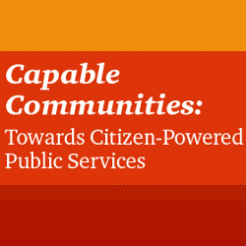People are willing to get involved in the Big Society agenda but lack the time to do so according to a report published by PricewaterhouseCoopers and the Institute for Public Policy Research yesterday.
The Capable Communities: Towards Citizen-Powered Public Services study took place over the past seven months within Darlington and Reading and covered three key areas: education, social care and public safety.
Quizzing professionals as well as a broader citizen base, the study showed that while citizens were willing to participate in the Big Society agenda, they felt that there were barriers to them doing so and an overwhelming majority of 90 per cent felt that the state should remain primarily responsible for delivering most key public services.
Some 82 per cent of those polled believed individuals and communities should do more to help the police cut anti-social behaviour. Some 42 per cent of people asked were willing to attend regular meetings with neighbourhood police and 46 per cent were willing to keep an eye on an elderly neighbour, while 20 per cent would mentor a child struggling in education.
But time and other commitments are highlighted in the study as the main obstacles to citizen participation. Some 36 per cent said that time constraints were preventing them from volunteering more with a further 13 per cent stating that work commitments were a barrier and 12 per cent pointing to family commitments as restrictive.
A lack of confidence in the ability of citizens to undertake public service activities and a territorial attitude from professionals fearing a shift from their services were also evidenced in the research. This, the study concluded, must be addressed by the government which should "embrace a major shift in its role and purpose and rethink the means of producing public outcomes by placing people and communities in the driving seat".
Nick Pearce, ippr’s director, said: "It is a mistake to think that if only ‘big government’ gets out of the way, the ‘Big Society’ will flourish. In our research we found that very often people wanted more not less help from public agencies in order to give them the skills and confidence to be more active citizens.
"It’s also true that the public have a clear idea that the state is primarily responsible for delivering services. People want to get involved so that they can improve those services, not take over the running of them. For instance, just 2 per cent of respondents said they’d be willing to set up their own school.”









